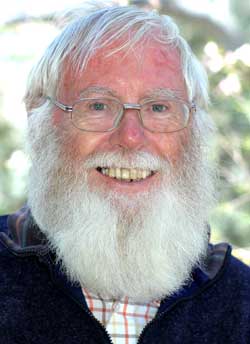
Council of Heads of Australasian Herbaria
Australian National Herbarium
Biographical Notes
 |
Council of Heads of Australasian Herbaria |
 Kuiper, Pieter (Piet) Jan Cornelis (1934 - 2017)
Kuiper, Pieter (Piet) Jan Cornelis (1934 - 2017)Born 30 July 1934 in Wieringermeer, Netherlands; died 10 December 2017.
Piet Kuiper grew up on a farm in the Wieringermeer. From an early age he was interested in field biology, especially plants and mushrooms. He joined the Dutch Youth Association for Nature Study, where he held various positions.
He obtained the degree of engineer in horticultural plant cultivation in 1958 at the Agricultural College in Wageningen and obtained his doctorate there in 1961 on The effects of environmental factors on the transpiration of leaves, with special reference to stomatal light response on the effect of different colors of light on opening and closing of stomata. He was then appointed as a researcher at this institution and worked for some time as a researcher in the United States.
Around 1980, together with the microbiologist and ecologist Jan Woldendorp, the plant ecologist Peter van der Aart and the Groningen geneticist Wilke van Delden, he led the so-called Plantago project, in which dozens of ecologists, physiologists and geneticists conducted research on plantain species.
He was also involved in research into the effects of air pollution on wild plants and research into stress factors and commercial plant species such as the tomato.
He retired on 1 January 1999.
After his retirement he continued to be involved in plant research, including field trips to Australia and Papua New Guinea.
In addition, as a renowned and enthusiastic mushroom expert, he continued to regularly advise on the toxicity and picking of mushrooms.
He was a keen photographer, he took many photos of the Australian flora and was generous with their distribution.
Kuiper married the sociologist Cecile Marguerite Helene Lapre (born Djokjakarta, June 6, 1936) on 5 July 1958. He regularly conducted botanical field research with her.
Together they took their own lives on 10 December, 2017.
Source: Extracted from: https://nl.wikipedia.org/wiki/Piet_Kuiper_(1934-2017)
Portrait Photo: Fagg, M., 2006